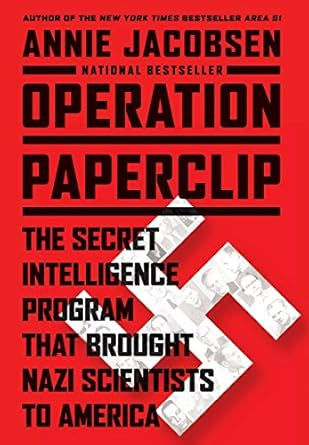Operation Paperclip - by Annie Jacobsen
- Liesl van Wyk
- Sep 24, 2024
- 3 min read
Who Should Read Operation Paperclip?
Operation Paperclip: The Secret Intelligence Program That Brought Nazi Scientists to America by Annie Jacobsen delves into one of the most controversial U.S. military and intelligence operations of the 20th century. It details how, in the aftermath of World War II, the U.S. recruited Nazi scientists—some deeply involved in war crimes—for their expertise, particularly in rocketry, chemical warfare, and high-altitude medicine. While these scientists contributed to major advancements, like the U.S. space program, the moral cost of their integration into American society raised questions that still reverberate today. Jacobsen meticulously examines this covert operation, painting a comprehensive picture of ethical compromises, Cold War politics, and scientific ambition.

Who Should Read This Book?
History Enthusiasts: If you are passionate about WWII, the Cold War, or military history, Operation Paperclip will captivate you. The book delves into the untold stories of Nazi scientists who shaped postwar technological development and the ethical challenges the U.S. faced in dealing with them. It's a must-read for those interested in the intersections of war, technology, and intelligence.
Science and Technology Buffs: For readers fascinated by technological advancements, especially in rocketry and chemical warfare, this book offers an in-depth look at the contributions of Nazi scientists to the U.S. space program and military. It is ideal for those who appreciate understanding the origins of modern scientific achievements—even when they come from dark, morally questionable places.
Ethical and Philosophical Thinkers: The book constantly poses the question: Was it worth it? It explores the ethical dilemmas of recruiting war criminals to gain a competitive edge in the Cold War. Readers who enjoy pondering moral questions, particularly in the context of national security, will find plenty to debate and reflect upon.
When You Should Read This Book
This book is best read when you are in a contemplative and focused mood. It is a detailed, heavily researched piece that demands your attention. Given its intricate historical narrative and the depth of ethical questions it raises, it’s not a casual read. This book is ideal for long, quiet weekends or dedicated reading sessions where you can absorb and reflect on its contents fully. You might also find it a fitting read when current events stir questions about moral compromises, government transparency, or the role of science in national security.
In What State of Mind You Should Be to Enjoy the Book
To truly appreciate Operation Paperclip, approach it with a balanced mindset—ready to absorb complex details but also willing to confront uncomfortable truths. The subject matter is morally and emotionally heavy, covering topics like war crimes, human experimentation, and the ethical failures of postwar governments. Be prepared to question long-held beliefs about the U.S. government’s actions during the Cold War and to reconcile your feelings about scientific progress with the dark origins of some of those advancements.
If you enjoy piecing together history, with a willingness to dive into grey areas, this book will be a rewarding experience. It’s a work that combines suspense, investigation, and historical reflection, requiring a certain level of emotional resilience to tackle its unsettling content.
Who Should Probably Not Read This Book
Casual Readers: If you’re looking for a light, easy read, Operation Paperclip isn’t for you. The book's dense content, extensive research, and intricate historical narrative may feel overwhelming for those seeking a more relaxed or entertaining read. The story can be disjointed and difficult to follow, particularly for readers unfamiliar with the historical context.
Readers Sensitive to Graphic Details: For those who find it distressing to read about war crimes, human experimentation, or the darker aspects of history, this book may be too much. Annie Jacobsen doesn’t shy away from detailing the atrocities committed by Nazi scientists, and while it is all historically accurate, it can be emotionally taxing.
Readers Expecting a Simplified Narrative: Some reviews have pointed out the lack of clear structure and the overwhelming amount of detail. If you prefer tightly organized narratives or have little patience for dense, investigative writing, this book might frustrate you. The shifting focus between scientific achievements, ethical questions, and bureaucratic cover-ups may leave you wishing for a more linear approach.

Conclusion
Operation Paperclip is a challenging but essential read for those who enjoy history, ethics, and science. It offers valuable insights into postwar American politics and the price of scientific progress. However, it is not for the faint-hearted or casual readers. Approach it with an open mind and a readiness to confront difficult moral questions, and you’ll find it to be a deeply thought-provoking and informative book.



Comments